
13 minute read
NEWS
SHOT IN SOUTH TYROL Ein Sommer in Südtirol (2021)
FILM COMMISSION Green Shooting Workshop
Advertisement
SHOT IN SOUTH TYROL Summer Love
Franziska Gasser (Maike Jüttendonk), a master vintner, travels to South Tyrol to look after her parents’ winery after her father Josef (Harald Krassnitzer, r.) is involved in a car accident. She is not happy to return home, in part due to long-standing conflicts: between her and her parents, between German speakers and Italians, and between her father and his arch-enemy Roberto Antonelli (Michele Oliveri, l.). Then again, there is Roberto’s charming son Marco... The television movie Ein Sommer in Südtirol, which forms part of the Herzkino series, will be broadcast on ZDF in 2021 and was shot in the autumn of 2020 in Bolzano, Brixen, Merano and the surrounding area. Karola Meeder directed, based on a script by Thomas Kirdorf.
ZDF/Stefan Ditner
M. Tessaro
Oscar Diodoro
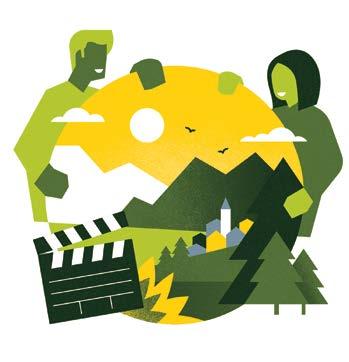
“The film industry is more than ready right now for greener film sets,” said sustainability expert Philip Gassmann in our TAKE #11 interview. Accordingly, there was a lot of interest in the multi-part Green Consultant training course that Gassmann held for IDM in 2020. “The first part of the course, held in the spring, focused on basic knowledge about how the various departments can set and maintain ecological standards,” says Renate Ranzi, the Film Location Coordinator at IDM Film Fund & Commission. The second part, which took place in November and was again a webinar, became even more concrete: “We spoke with the nine participants about the special features South Tyrol has to offer in terms of sustainability, and about how they, as green consultants, will advise producers who will shoot here in the future.” Looking forward, these new sustainability experts are to assist those productions that wish to carry out their filming in a climate-friendly manner. The funding guidelines of South Tyrol’s film subsidies will provide for this option starting in 2021: Those who select the “green option” when applying for funding – something that will also factor in to the funding decision – must take a number of criteria into account when filming in South Tyrol, such as using renewable energy on set and climate-friendly transportation. To that end, interested productions must hire a local green consultant. The course also included discussions with service providers to ensure that they, too, are prepared to meet the needs of green production. An independent institute commissioned by IDM will check whether the production complies with the criteria. “We’ve noticed that many productions are already interested in working in a more sustainable way on set,” explains Ranzi. IDM’s new “green shooting” certificate is designed to reward this willingness to lead the way in green filming, with the help of the new, local sustainability consultants.
OBITUARY VALENTINA PEDICINI 1978–2020
OBITUARY Valentina Pedicini 1978–2020
Riccardo Ghilardi
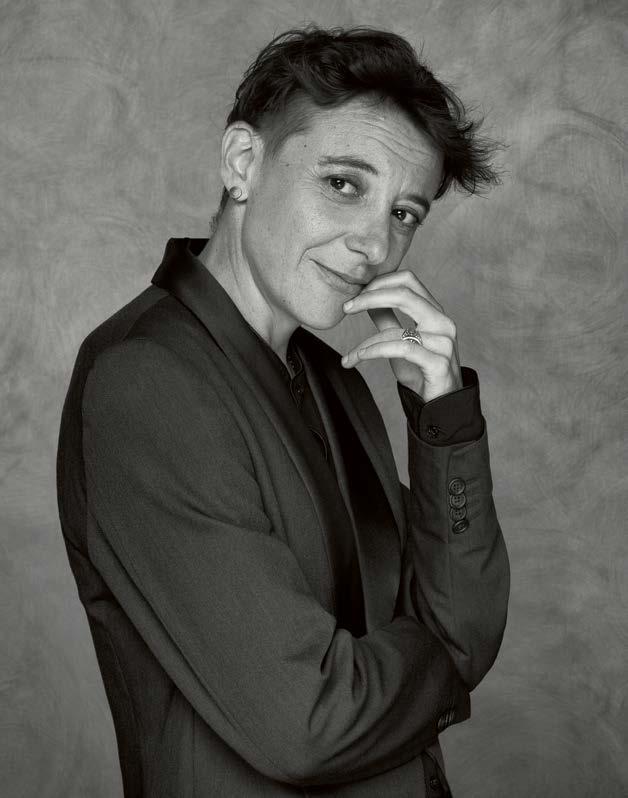
VALENTINA PEDICINI was born in 1978 in Brindisi, Apulia. After studying linguistics and literature at university, she earned a degree in documentary directing at the ZeLIG School for Documentary, Television and New Media in Bolzano, where she made the films Mio sovversivo amore, Pater Noster and her graduation project My Marlboro City. In 2013, she won the Best Italian Documentary Award at the Rome Film Festival with her first feature-length documentary Dal profondo (From the Depths) about Italy’s last – and only – female miner, who worked in a Sardinian coal mine. Pedicini’s feature debut, Dove cadono le ombre (Where Shadows Fall) is about a dark chapter in Swiss history, the attempted genocide of the Yenish people, and screened at the Venice Film Festival in 2017. She returned to documentaries in 2019 with Faith, a black-and-white portrait of a sectarian community, which screened at the 2019 IDFA and the 2020 Berlinale Critics’ Week, bringing her international acclaim. Valentina Pedicini passed away because of an illness on November 20, 2020, in Rome.
DEAR VALE,
When we were together for the last time, we laughed and laughed. It was because your lunar horoscope hit the nail so exactly on the head: It said that you are sensitive, restless and always curious to discover unknown worlds. And there was more: Leading personalities from art and media are often found under this zodiac sign. Now you’ve embarked for the most unknown of all worlds. How will you manage to open it up for us?
We’re so used to always expecting new stories from you that even now there’s nothing we can do but wait, incredulous and stunned, but somehow also confident.
And deeply moved.
Since your very first steps in the world of film, which we were fortunate enough to walk alongside you, you’ve been a leading lady. You were always simply there: extraordinary, ever-present, convincing.
Knowing that you were surrounded by love until the very end is only a small consolation in view of your departure. As are the films that you leave us as memories: works about faith, love and the depths of humanity.
You will be sorely missed.
GEORG ZELLER, a filmmaker and writer, was a tutor at Bolzano’s ZeLIG film school during Valentina Pedicini’s student days and has been friends with her ever since. This obituary originally appeared in salto.bz, an online magazine.
THREE QUESTIONS FOR ... Graziella Bildesheim
FILM LOCATION Short Film Workshop
THREE QUESTIONS FOR… Graziella Bildesheim, Maia Workshops Founder
A member of the David di Donatello Italian Film Academy, Bildesheim represented Italy on the Board of the European Academy for the two-year term 2018-19 and is the founder of Maia, a training and coaching program for emerging producers.
1. Due to the Covid-19 pandemic, production and training in the film industry are currently lying idle. How can producers continue their training in this difficult phase? GB Training in production is an ongoing lifelong process. The pandemic has forced producers to react to practical limitations; on the other hand, there have been new and diverse sources for creative inspiration: Think tanks have been set up online within the modified programs of film festivals and markets; masterclasses and panels have animated the debate on what films we want to produce, and how we will get our audience to see them. We should take advantage of these opportunities to learn to cope with this changing world.
2. How can producers be supported so that they can get back on track as quickly as possible this year? GB Quite a few producers have started shooting again as soon as it was possible, with sanitary and financial safety measures put in place. This has been possible especially in contexts where funding bodies are close to their beneficiaries, where they understand their needs and can rapidly adapt to ensure support in changing circumstances.
3. The Maia Workshops connect creative people from all over Europe. Where do you see the greatest opportunities in cross-border collaboration? GB There are undeniable advantages in co-producing when the stories we want to tell call for cross-border cooperation, but co-production is a complex business. It takes both a shared vision and strong relationships between producers to navigate it successfully. The added value of our workshops lies precisely in this: Geared as they are toward emerging producers, they supply a safe environment in which people can experiment and learn to be confident in their choices while getting to meet an invaluable network of peers.
www.maiaworkshops.org The short film workshop held via Zoom (top), instructors Adam Selo and Olga Torrico (bottom)

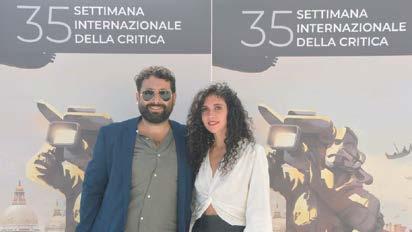
SHORT AND SWEET What is it about short films that makes them so appealing? Adam Selo says it’s due to “a freedom to experiment with novel forms and cinematic languages, and also greater independence for filmmakers in comparison with feature-length films.” Selo runs Sayonara Film, a production company that specializes in short films, together with Olga Torrico. Together with screenwriters Sofia Assirelli and Zsuzsanna Kiràly, Selo and Torrico conducted a short-film workshop organized by IDM in November and December 2020. Nineteen aspiring filmmakers and producers, eight of whom had their own shorts in the works, participated in the online sessions. “We were really impressed by the participants’ projects,” says Selo. “They all had a very fresh approach, a willingness to take a chance on something new, and an impetus on the part of the creators to tell their stories.” The instructor underlines that a warm relationship with the participants developed, despite distance learning: “We’re still in contact and look forward to following the projects to completion.” The workshop included masterclasses on production and distribution, also conducted by Selo and Torrico. “Shooting a short film isn’t difficult from a technical perspective; anyone can do it nowadays. The challenge is to achieve a high level of storytelling and acting,” says Selo. This is the way to enter the short-film market, a niche that is often seen merely as a stepping-stone, he says. “Which is a shame, because it’s an exciting market with an important cultural dimension and economic opportunities as well.” Info: film.idm-suedtirol.com
NEWS FACTS & FIGURES 190
RISING STAR Simone Toso
FACTS & FIGURES Shooting Days in South Tyrol
A look back at the 2020 film year reveals: A total of 190 shooting days were carried out in the film location of South Tyrol. This figure reflects the long Covid-19 lockdown throughout Italy in the spring. However, there was also a long and labor-intensive summer of shooting, during which most of the planned productions were filmed and postponed projects were resumed – with the necessary safety and hygiene requirements implemented on set, of course.
190
Simone Toso dressed Ralph Fiennes (bottom l.) for the new Bond film
RISING STAR Spies and Supervillains
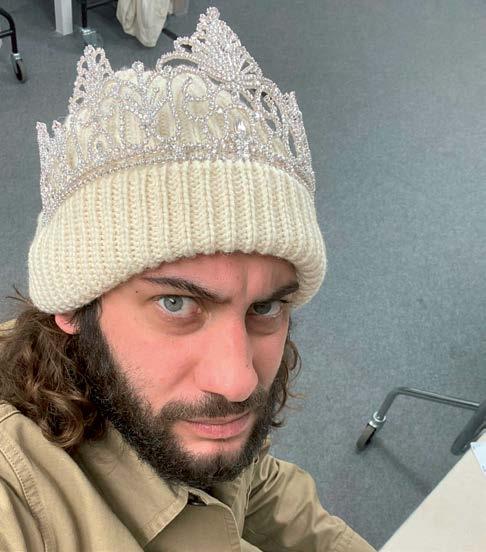
LANDMARK MEDIA/Alamy In 2021 the new Bond film No Time to Die will in all probability be finally released in cinemas, after a long wait and a turbulent journey: a journey Simone Carlo Toniato Toso, a native of Bolzano, was part of. Working under Suttirat Anne Larlarb (Slumdog Millionaire, American Gods), as principal costume stand-by he made sure that Ralph Fiennes and Christoph Waltz were dressed perfectly for their roles as spies and supervillains. Toso, who lives in London, previously worked as a costume assistant with renowned names such as Cristina Sopeña and Leesa Evans on Zoolander 2 (2015), and in 2016 supported the team of Oscar winner Lindy Hemming on Wonder Woman. For Toso, it all began in his university town of Turin, where, after graduating cum laude with a degree in set design from the Accademia Albertina di Belle Arti art school, he established himself professionally. In 2014, an offer arrived to work on The Avengers: Age of Ultron in the neighboring Aosta Valley; he accepted immediately. During this time he met designer and costume supervisor Stefano de Nardis and worked with Oscar-winning costume designer Alexandra Byrne (Elizabeth – The Golden Age). Toso impressed both of them, and word of his dedication and passion quickly spread. The South Tyrolean’s latest project was working under costume designer Liza Bracey (Yesterday, The Girl with All the Gifts), assisting lead actor Jack Bannon in the Batman prequel series Pennyworth (2020–21).
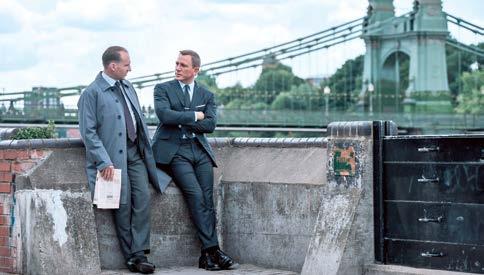
NEW FACES Katia Fellin
Whether as a prosecutor in Wild Republic or in the mafia film Il Pastore (below), Katia Fellin delves into the darker side of South Tyrol.
Puria Safary
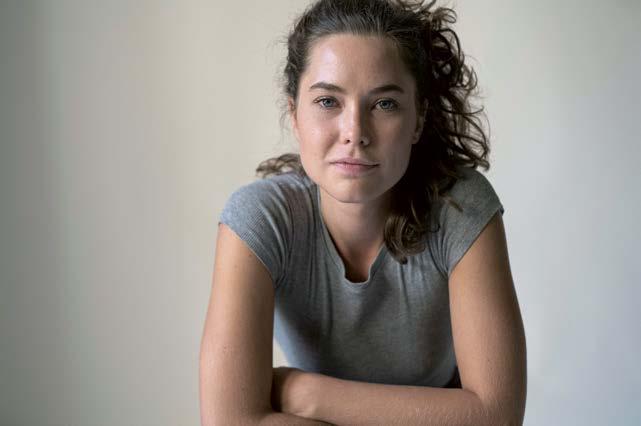
NEW FACES Katia Fellin
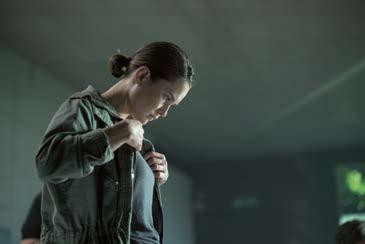
Katia Fellin has always been adaptable. She was born in Germany but grew up in the South Tyrolean village of Oberbozen, where she quickly learned not only the Italian language but also South Tyrolean dialect, later adding English and Spanish. It was a talent for languages that stood the 28-year-old in good stead when it came to playing the role of prosecutor Ines Tomasi in the streaming series Wild Republic (► Production Report p. 28) which was filmed recently in South Tyrol. “My character speaks several languages, including local dialect,” Fellin says. “That gives her a more powerful connection to the story.” The high-altitude filming locations of the MagentaTV series had a similar effect, she’s convinced: “The further you go into the South Tyrolean mountain landscapes, the more shadowy, and even powerful, are the aspects that emerge,” says the Berliner-by-choice, who has spent years in front of the camera for TV and cinema productions and was an ensemble member of the Mecklenburg State Theater in Schwerin in 2018/19. Things could have turned out very differently: After graduating from school, Fellin initially studied geotechnology and mathematics. She draws surprisingly exciting parallels between the natural sciences and acting: “In my studies, I had to be very creative,” she explains. It wasn’t about mathematical engineering and fixed formulas, but about theories: about diverse, self-developed paths to a certain goal, the meaningfulness of which she first had to prove. It was a way of thinking that Fellin also applied to creating her characters. “This is achieved through trial and error, through an almost scientific collection of movements, emotions, gestures and experiences,” she says, describing her approach, which is different for each character – until she finds the right formula. Just like math.
Martin Rattini

FILMOGRAPHY
2021: Il Pastore TV Series 2021: Wild Republic TV Series 2020: Der Palast TV Miniseries 2019: Tatort Dresden: Die Zeit ist gekommen TV Series 2018: Il ladro di giorni Feature Film 2016: A Hidden Life Feature Film
NEWS
TOP 5 Film Portraits #shotinsouthtyrol
TOP 5 Five Documentary Films about Extraordinary People
FILM Becoming Me (2019) DIRECTOR Martine De Biasi PRODUCER MediaArt Production (IT) LOCATIONS Überetsch region (St. Michael, Kaltern, Tramin, Girlan, Montiggl) STORY Marian, a young man from South Tyrol, was once called Marion. In an intimate portrait, his former girlfriend traces his journey towards his true self.
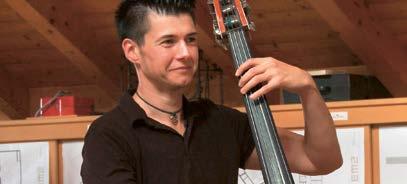
FILM The Fifth Point of the Compass (2017) DIRECTOR Martin Prinoth PRODUCER Miramonte Film (IT), Against Reality Pictures (DE) LOCATIONS Seiser Alm Alpine pasture, St. Ulrich, Meran, Bolzano STORY A young South Tyrolean travels to Brazil in 2009 in search of his birth mother. On the way back, he dies in an Air France crash over the Atlantic.

FILM Ama Dablam – Holy Mountain (2018) DIRECTOR Reinhold Messner PRODUCER Tempest Film Produktion und Verleih (DE)
LOCATIONS Sulden STORY An ice avalanche hits four alpinists on the 6,814-meter-high Ama Dablam in 1979, among them Everest pioneer Sir Edmund Hillary’s son.
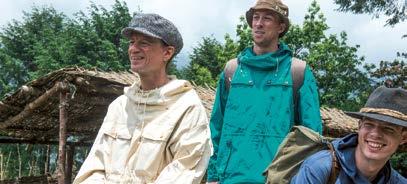
FILM Monika Hauser – A Portrait (2016) DIRECTORS Evi Oberkofler, Edith Eisenstecken PRODUCER Thali Media (DE) LOCATIONS Vinschgau valley, Bolzano STORY A cinematic portrait of South Tyrolean doctor Monika Hauser, who helps women traumatized by war through her organization Medica Mondiale.
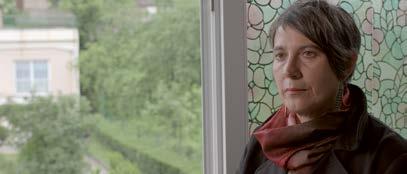
FILM Viktoria Savs – Die Kaisersoldatin (2018) DIRECTOR Karin Duregger PRODUCER WEGA-Filmproduktiongesellschaft (AT) LOCATIONS Meran, Dolomites, Sexten, Toblach, Fischleintal valley STORY Viktoria Savs, who fought disguised as a man on the Dolomite Front in World War I, was later styled by the Nazis as a “girl hero.”
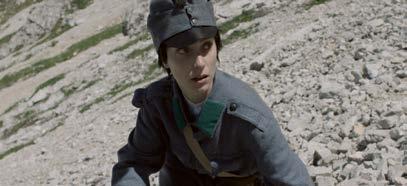
MediaArt
Against Reality Pictures
Lars Jacobsen
Thali Media
WEGA






